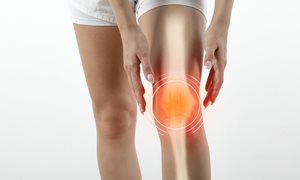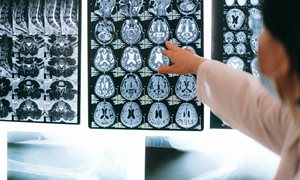
'They sometimes think I'm a sorceress,' says technical physician Merel van der Stelt, smiling. 'Take this lady without a lower leg. Yesterday she came here. We scanned her stump and today she already has a 3D printed prosthesis. Idrissah, the local physiotherapist and Osman, the local prosthetist in training, will now help her with rehabilitation.'
Merel works as a Technical Medicine Technician in our 3D Lab. She is at Masanga Hospital in Sierra Leone (West Africa) for the third time. This time for her PhD research. Goal: standardize and automate the entire 3D printing process for lower leg prostheses, so that locally trained personnel will soon be able to do it all themselves.
Two 3D printers in the jungle
With her cell phone, Merel enthusiastically shows off her workplace in Masanga. 'Look, here are the two 3D printers. We printed this prosthetic socket yesterday. And this is Alusain (he waves happily into the camera, ed.). He is super happy with his prosthesis and runs practice laps here all day.' The hospital is located in the middle of the jungle in Sierra Leone, a 50-minute drive from the big city of Makeni. Once a leprosy hospital, it is now a hospital that specializes in wound care and amputations, among other things, run by Sierra Leonean doctors and Dutch tropical doctors. In addition to daily care, they also train Sierra Leoneans on a large scale to become basic surgeons. There is not much technology available, except for an X-ray and an ultrasound machine. And then suddenly there are two 3D printers there, how is that possible?
Many amputated arms and legs
Merel explains how trauma surgeon-in-training, Lars Brouwers, brought a 3D printer to his good friend Wouter Nolet, a tropical doctor at this hospital, in 2018. The goal was to assess the need for 3D printed care in the country. Lars, the co-founder of the 3D Lab from the Elisabeth-Tweesteden hospital, collaborated with Thomas Maal from the 3D Lab of our Radboudumc. Merel: "The first time I came here, I was an intern from my Technical Medicine program, sent by Lars and Thomas. I was immediately enthusiastic, you can mean so much here. In the beginning, we mainly printed arm prostheses, braces and splints, later also lower leg prostheses for people who had their limbs taken off during the civil war. But we mainly see people with amputated legs and arms, often as a result of infected wounds. Due to traffic accidents, a fall from a tree or a snake bite. Often they go to a hospital too late or they go to a traditional herbalist (traditional healer), and that is not always beneficial.'
With a prosthesis, people count again
In recent weeks Merel has visited people who received a leg prosthesis two years earlier. Most of them are still doing very well. One man was enthusiastically chopping wood; he couldn't do that with his crutches before. Laughing, 'And another was walking through a small river near his house, which of course is not good for the material.' She explains that in Sierra Leone, they look at disabled people very differently. 'They are less accepted, without an arm or a leg. After amputation, they often don't dare return to their homes and families. With the prosthesis they count again.
Joshep, with his prosthesis, is back at work behind his loom. The prosthesis helps well with this since you need two legs to practice the technique. Merel is also allowed to try for a while.
Not easy with the questionnaires
In the three months that Merel has been there, she would like to give as many people as possible a new prosthesis. She does that too, such as for the four-year-old boy who is carefully kicking a ball with his bright red prosthesis. But she is now mainly there for her doctoral research, "Quality before Quantity". She has to administer follow-up questionnaires, to scientifically measure the effect and assess whether patients' quality of life improves with a custom-made prosthesis. And that's quite a job: "People often can't read. I work with an interpreter because hardly anyone speaks English. And I have to adapt questions. About climbing stairs for example, most people here have never seen a staircase. And how do you explain what depressive feelings are, they don't know that concept here!
Daily contact with Nijmegen
She has almost daily contact with the 3D Lab in the Radboudumc. "We want to realize a standardized and automated workflow for the entire package: from measuring, scanning and printing to rehabilitation. And we want it to be good, fast and affordable. In the Nijmegen 3D Lab, we make software for this, including learning and training programs. The idea is that it will run entirely with local people."
Proving that it works
We are still deliberately keeping it small for now, and first want to 'prove' that it works, says Merel. We are also going to involve the university in the capital Freetown. Sierra Leone is one of the poorest countries in the world. If it works here, we can also roll it out to countries such as Vietnam, Laos or Suriname.' According to her, the research in Sierra Leone also provides insights for the Netherlands. Here, too, 3D technology may be able to make our prosthetic care better, faster and more affordable. In the Netherlands, we still work mostly in the traditional manner, using plaster models.
I can make a difference here
In addition to the 3D Lab of the Radboudumc, the University of Applied Sciences Arnhem Nijmegen and the Technical Universities of Twente and Delft also participate in the Dutch research group. Merel returned to the Netherlands on 14 December. 'From Nijmegen, I can continue the preparatory work and I also supervise seven students who are collaborating in the project. This week I will pass the baton in Sierra Leone to Pien de Graaf, a student of Technical Medicine. She will continue making prostheses and training the local staff. I am so happy that I ended up in Sierra Leone purely by chance. I think that we can really make a difference here."
Last weeks eleven leg prostheses were made by Merel (second from left) and her team. See in the photo, on the left Idrissah, the local physiotherapist and on the right Osman, the prosthetist who is training Merel. In the middle, a selection of the people who received a prosthesis. Pien, second from right will take over Merel's work in Sierra Leone in the coming months.
More Information
If you want to know more about the 3D project in Sierra Leone or read patient stories. Then visit: www.3dsierraleone.com
Related news items

Survey of patients to address knee pain from removed meniscus
19 November 2021 Patients with persistent knee pain after meniscus removal can participate at three locations in the Netherlands in the AIR2 study by ATRO Medical, a spin-off of the Radboudumc and DSM. go to page
Turbo Grants for four medical-technical research projects
19 October 2021 Four TURBO grants were recently awarded to new technical-medical research proposals. The grants are part of the TURBO program, a collaboration between the University of Twente (TechMed Centre) and the Radboudumc. go to page
Broken teeth coronastress poses a danger to our teeth
6 May 2021 Teeth grinding and molars on top of each other: stress from corona causes an increase in dental damage. That's what they noticed at the department of dentistry at Radboudumc. go to page
Millions of euros for study of laser treatment for glioblastoma
2 April 2021 A research group from Radboudumc and UMC Utrecht is to investigate laser treatment of a rare brain tumor, glioblastoma. 3.9 million euros has been made available for the research by Zorginstituut Nederland and ZonMw, under the auspices of the Subsidy Scheme for Promising Care. go to page
ATRO Medical, Radboudumc and Samaplast develop new meniscus prosthesis Consortium receives EUROSTARS grant for innovative project
16 July 2020 An international consortium led by ATRO Medical, a spin-off of Radboudumc and DSM, will receive € 800,000 European funding for an innovation aimed at patients with knee osteoarthritis. These patients often suffer from cartilage wear due to a meniscus that no longer works properly. go to page